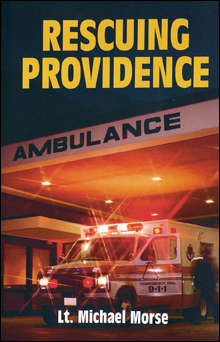Michael Morse’s Rescuing Providence
By BILL RODRIGUEZ | March 19, 2008

ON CALL: Morse’s vivid retelling of a 34-hour
day. |
When Michael Morse was a boy in the 1970s, the TV show Emergency was his favorite, and when playing war he always wanted to be the medic. So when the Providence firefighter was transferred to the rescue division, supposedly for only six months, he found that he liked it. Preferred it, actually.
Sixteen years have gone by, with Lt. Morse working one of the busiest EMS operations in the country — the Rescue 1 truck he rides responds to approximately 5000 calls every year. He has packed in more than enough experiences to fill the 155 pages of Rescuing Providence (Paladin Press, paperback, $22), as he takes us along with him on a 34-hour overtime tour of the city. Rescue 1 responds to a maternity call and to someone described as “an emotional woman with a knife, bleeding from the wrists,” to a couple of shooting victims and a belligerent drunk driver who plowed into a guard rail. And so on.
Morse is working out of the Allens Avenue Station, “located within blow-up distance of the area’s fuel tank farms.” Rescue 1 and the other teams respond to more than fires, so they respond more often. The absence of opportunities to rush into burning buildings combined with constantly being called — not just being on call — makes EMS work something that firemen more often are reluctantly assigned to rather than sign up for. “Most young guys want nothing to do with rescue,” Morse writes. “The thrill of firefighting is something that understandably takes all the good guys away from EMS.” (That assessment is harder than he shows to be the case, as he describes some dedicated colleagues at work.)
Morse’s own enthusiasm for rescue can get downright giddy. Under “Acknowledgments” he quotes from the St. Crispin’s Day speech in Henry V, which addresses “we few, we happy few, we band of brothers . . . .” He feels that being given life-and-death responsibilities every day has improved him as a person, though the occasional challenge of a burning building had not. Morse recalls standing over the broken body of a college student who had slipped off a dormitory roof, as he is about to take him to an emergency room that would save his life, with not a minute to spare. Morse thinks: “I’m just a regular guy who a few years ago couldn’t manage his own life, never mind leading a team of firefighters in this grim effort.”
Forty-two at the time recounted, Morse has been sobered up by the combined efforts of his wife, Cheryl, who is suffering from MS, and his daily mortality reminders on the street. He tells us about a 15-year-old kid with two bullets in him who looked up and declared, “I’m going to die.” Morse writes: “I don’t like lying to people who I know will be dead in minutes, because it doesn’t seem fair.” So he tells them to hang on but doesn’t tell them that they’re going to live.
Many of the rescue calls are from people who have no emergency but simply want a free ride to the hospital, for a toothache or even a bad dream. And then there are the regulars like Darryl, a street drunk who calls 911 every day, sometimes twice, this day wearing clean clothes he stole from someone else in detox the night before.
At one point Morse and his partner respond to a stabbing, and one of the friends of the victim says to him, “If he dies, you die,” as they make their way through the crowd.
Such treatment has taken its toll on his partner Mike, who has told him that he’s putting in for reassignment to a ladder truck. Morse tells us that he has been thinking of quitting himself, since the work can be unbearable without such a compatible partner. Perhaps coincidentally, perhaps for the convenience of time compression, for his last shift this day he is assigned a young firefighter named Renato who enthuses over saving the life of an elderly woman who would have died of congestive heart failure without the EMTs. “Let me know if you ever need a partner,” he says to Morse. We’re glad for both of them.
To check in on how they're doing, you can go to Morse's ongoing blog at rescuing-Providence.Blogspot.com.
 Related
Related:
 Topics
Topics:
Books
, Medical Specializations
, Health and Fitness
, Medicine
, More  , Medical Specializations
, Health and Fitness
, Medicine
, Entertainment
, Media
, Television
, Fires
, Less
, Medical Specializations
, Health and Fitness
, Medicine
, Entertainment
, Media
, Television
, Fires
, Less 